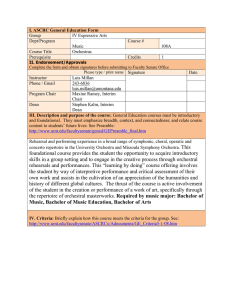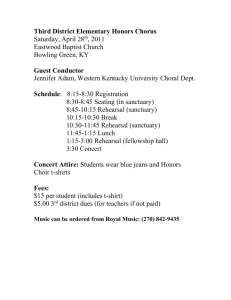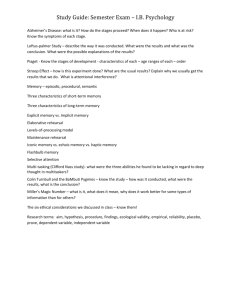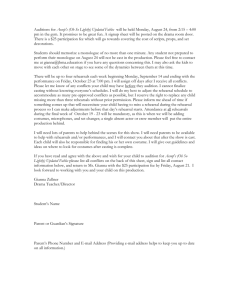Use to propose new general education courses (except writing courses),... gen ed courses and to remove designations for existing gen...
advertisement
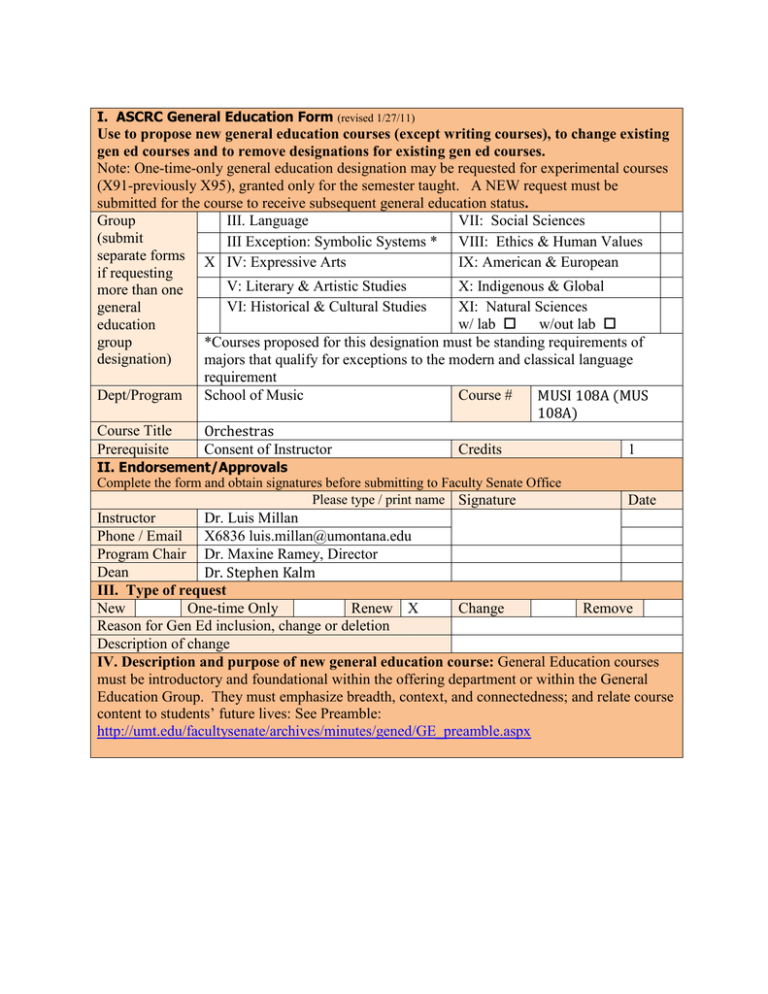
I. ASCRC General Education Form (revised 1/27/11) Use to propose new general education courses (except writing courses), to change existing gen ed courses and to remove designations for existing gen ed courses. Note: One-time-only general education designation may be requested for experimental courses (X91-previously X95), granted only for the semester taught. A NEW request must be submitted for the course to receive subsequent general education status. Group III. Language VII: Social Sciences (submit III Exception: Symbolic Systems * VIII: Ethics & Human Values separate forms X IV: Expressive Arts IX: American & European if requesting V: Literary & Artistic Studies X: Indigenous & Global more than one VI: Historical & Cultural Studies XI: Natural Sciences general w/ lab w/out lab education group *Courses proposed for this designation must be standing requirements of designation) majors that qualify for exceptions to the modern and classical language requirement Dept/Program School of Music Course # MUSI 108A (MUS 108A) Course Title Orchestras Prerequisite Consent of Instructor Credits 1 II. Endorsement/Approvals Complete the form and obtain signatures before submitting to Faculty Senate Office Please type / print name Signature Date Instructor Dr. Luis Millan Phone / Email X6836 luis.millan@umontana.edu Program Chair Dr. Maxine Ramey, Director Dean Dr. Stephen Kalm III. Type of request New One-time Only Renew X Change Remove Reason for Gen Ed inclusion, change or deletion Description of change IV. Description and purpose of new general education course: General Education courses must be introductory and foundational within the offering department or within the General Education Group. They must emphasize breadth, context, and connectedness; and relate course content to students’ future lives: See Preamble: http://umt.edu/facultysenate/archives/minutes/gened/GE_preamble.aspx Rehearsal and performing experience in a broad range of symphonic, choral, operatic and concerto repertoire in the University Orchestra and Missoula Symphony Orchestra. This foundational course provides the student the opportunity to acquire introductory skills in a group setting and to engage in the creative process through orchestral rehearsals and performances. This “learning by doing” course offering involves the student by way of interpretive performance and critical assessment of their own work and assists in the cultivation of an appreciation of the humanities and history of different global cultures. The thrust of the course is active involvement of the student in the creation or performance of a work of art, specifically through the repertoire of orchestral masterworks. Required by music major: Bachelor of Music, Bachelor of Music Education, Bachelor of Arts V. Criteria: Briefly explain how this course meets the criteria for the group. See: http://umt.edu/facultysenate/documents/forms/GE_Criteria5-1-08.aspx Fundamental issues dealing with basic techniques as related to the orchestral medium and interpretation are studied and explored for a perspective of aural, visual and kinesthetic involvement. The student is asked to engage in the creative process by way of performance during the University Orchestra course. In addition, they are asked to engage in critical assessment of their own work during rehearsals and after performances. This class provides opportunities for students to develop their musical potential and aesthetic understanding through playing in an orchestral ensemble. Study includes the care and cultivation of a beautiful tone, aesthetic awareness, the ability to read music, the building of technical skills, team spirit, and responsible rehearsal habits. Students will strengthen listening skills and their ability to analyze and evaluate music and music performances. Attention will also be given to relating their music experiences to personal development. . VI. Student Learning Goals: Briefly explain how this course will meet the applicable learning goals. See: http://umt.edu/facultysenate/documents/forms/GE_Criteria5-1-08.aspx Students will express themselves at each orchestral practice sessions/rehearsal; to perform the selection or technique to be learned or explored. Material presented for study represents styles and genres from a global perspective. Western and nonwestern composers and styles are presented as well as music from a wide varied of historical time periods. In addition, students are asked to apply a fundamental knowledge of music theory and history to their performances, the structures and forms of the artistic language to convey meaning. Students present the product of their work at several concerts throughout the academic year. Critiques and reviews are done within the rehearsal setting and after each performance. VII. Justification: Normally, general education courses will not carry pre-requisites, will carry at least 3 credits, and will be numbered at the 100-200 level. If the course has more than one pre-requisite, carries fewer than three credits, or is upper division (numbered above the 200 level), provide rationale for exception(s). 1-2 credit hour courses in music conform to commonly accepted practices in higher education in School of Music for applied learning and include skills courses , laboratory ensembles and studio work. This mode includes activities where students receive hands-on learning experience continually supervised by the instructor. Work is normally completed in the learning environment, but may include out-of-class assignments. The contact hours are be devoted primarily to practice, mastery, clarification, and application of material, rather than presentation of new or theoretical material. VIII. Syllabus: Paste syllabus below or attach and send digital copy with form. The syllabus should clearly describe how the above criteria are satisfied. For assistance on syllabus preparation see: http://teaching.berkeley.edu/bgd/syllabus.html The University of Montana Symphony Orchestra MUS 108A/308A Section 1 - Autumn 2011 1 Credit REHEARSALS Dr. Luis Millán 243-6836 (O) 327-0249 (H) luis.millan@umontana.edu MWF 2:15-3:45 in Music Building Room 1 CONCERTS Clarinet Convention Saturday, 10/8 Tour Sun-Wed, 10/30-11/2 Fri, 11/4 Home Concert Orchestra Festival 7:30 Concert Tour 7:30 11/6-8 Sunday, 11/6 4:00-6:00 Dress Monday, 11/7 7:30 Concert Wednesday, 12/7 7:30 UT Saturday, 1/21 Sunday, 1/22 9:30-12:30, 2:00-5:00 11:00-12:30, 2:00-5:00 Rehearsal December Concert OPERA CAMP GRADING POLICY Grades will be determined by Dr. Millán based on attendance and rehearsal preparation. Missing a concert will cause an automatic grade reduction. CONCERT ATTIRE Women: Long black dress or full length black dress pants with black top, modest neckline, ¾ length or longer sleeves, black hosiery, black shoes – no open toes. Only small, very modest jewelry is acceptable. Men: Black tuxedo, black bow tie, white tuxedo shirt, black socks and black shoes. MUSIC STANDS Every UMSO member must have a portable music stand for sectional rehearsals. Wire stands can be purchased in the Music Office. ACADEMIC MISCONDUCT & STUDENT CONDUCT CODE All students must practice academic honesty. Academic misconduct is subject to an academic penalty by the course instructor and/or disciplinary sanction by the University. All students need to be familiar with the Student Conduct Code. The Code is available for review online at www.umt.edu/SA/VPSA/Index.cfm/page/1321. EXPECTATIONS Attendance Orchestra members are expected to attend all rehearsals. If you must miss a rehearsal, arrive late, or leave early, you must notify Dr. Millán and your section leader as early as possible. Active Participation in Rehearsals Orchestra members are expected to be active participants in the constant improvement of the ensemble. You are expected to: • Bring a pencil to every rehearsal. • Use the pencil every rehearsal to write in the conductor’s comments and mark sections you need to practice on your own. • Fix your own mistakes. Do not wait for the conductor to tell you which sections need work. Mark sections you need to practice on your own. When the conductor is working with another section of the orchestra, silently practice fingerings, rhythms, bowings…anything that can be fixed without disturbing the other musicians. • Always play musically. Practice • Be ready for every rehearsal by checking the weekly schedule and practicing those works to be rehearsed. • In addition to practicing for upcoming rehearsals, you must also practice sections of pieces worked on in the previous rehearsal to reinforce the technical and musical aspects addressed in the rehearsal. • Immediately begin working on the most difficult sections. • Practice slowly and accurately. Your goal should be consistency. “Don’t practice until you get something right, practice until you can’t get it wrong.” • Get together with your colleagues in mini-sectionals outside of scheduled rehearsals. • Listen to recordings of the works with your part or the score. Recordings of the works are available on Moodle. Collegiality Orchestra members should support each other both in and out of rehearsal. Please note: Approved general education changes will take effect next fall. General education instructors will be expected to provide sample assessment items and corresponding responses to the Assessment Advisory Committee.

